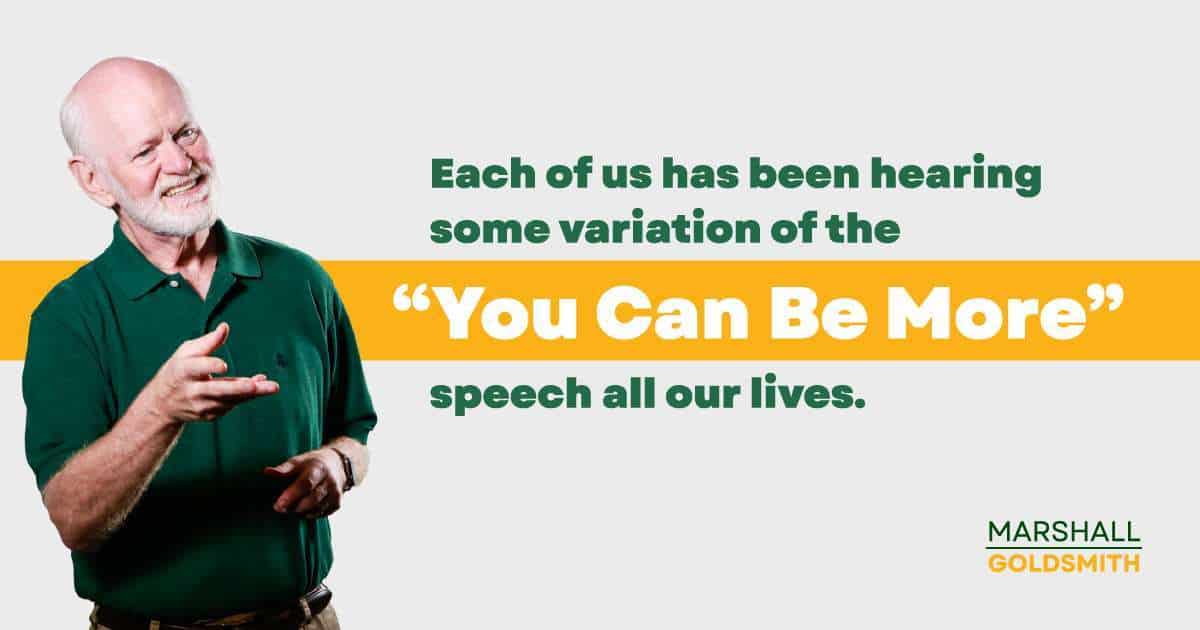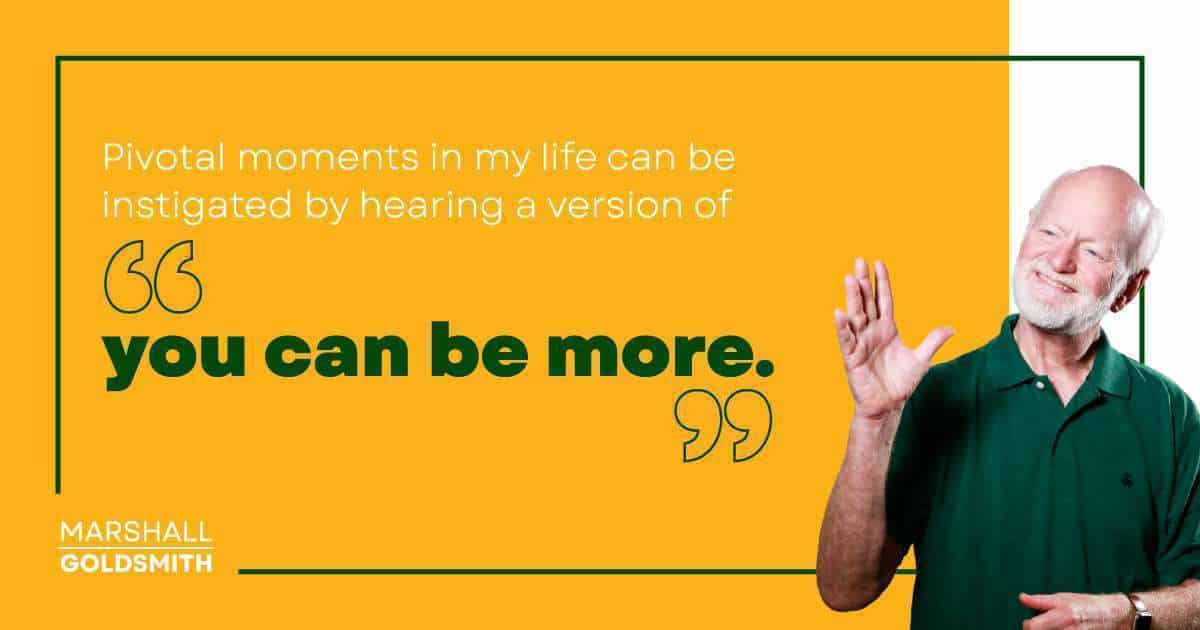Playing Favorites By Marshall Goldsmith There’s a reason I devote...
How to Hear the “You Can Be More” Speech
The great NFL player Curtis Martin once described for me one of the most significant moments in his NFL career. It happened at the New England Patriots training camp in 1996 after Curtis’s rookie season, when he had led the American Conference with 1,487 yards rushing.
Head coach Bill Parcells, a legendary motivator, gathered all the running backs and receivers for a last-man-standing endurance test of sprints and drills. As exhausted players started dropping out after 50 minutes, Curtis was determined not to quit before Parcells blew the whistle. An hour later, he was the only player left on the field, finishing sprints on hands and knees but refusing to be broken until Parcells mercifully ended the session. Afterward, in the locker room, Parcells told Curtis, “I did that because I wanted you to learn this about yourself: You can be so much more.”
Curtis’s story reminded me that each of us has been hearing some variation of the “You Can Be More” (or YCBM for short) speech all our lives.
I’m sure you’re familiar with it, too. In one form or another, it was an essential component of your parent’s cheerleading repertoire whenever they were enthralled with you (“I’m proud of you . . .”) or disappointed (“I expect more from you . . .”).
It’s a speech you need to hear at regular intervals in your life. Unfortunately, it’s also a speech that is dropped so casually into conversation—in many guises—that it might sail over your head. There’s rarely a blaring alarm announcing that a YCBM missile is coming your way.
The YCBM speech as assignment was what corporate expert Sandy Ogg heard when Unilever’s CEO asked him to identify the company’s valuable talent. The speech took the form of a frustrated outburst when I shouted at a client, “Dammit, when are you going to start living your own life?” It was phrased as a question when a client asked me, “Who are your heroes?” Fortunately, in all three cases, the YCBM message eventually came through loud and clear.
Each of the half dozen or so pivotal moments in my life — moments that brought me closer to my OTG — were instigated by an unsolicited and unexpected YCBM speech: Paul Hersey asking me to fill in for him at a lecture, assuring me that I could pull it off; the head of American Express telling me I’d be better off working for myself, without a senior partner; a literary agent from New York tracking me down to say, “You should write a book.” These are only some of the times I’ve been on the receiving end of the YCBM message. Who knows how often I missed equivalent messages because I wasn’t paying attention?
DO THIS: For an extended period of time—a month at least— keep a log of every time someone says something to you that sounds as if they see latent potential that you have been overlook- ing.

It can be specific praise (“That was a good point you made in the meeting. It never occurred to me”), an open-ended suggestion (“You should be more assertive”), or tough love (“Do it over. I expected better from you”). This isn’t a test on which you can be right or wrong about the comment’s meaning. The goal is to open your eyes and ears to how often people are communicating that they see something promising or undeveloped in you that you should exploit. You’re not just looking for praise. You’re looking for insights about how you can be better.
Keeping a meticulous log elevates awareness and appreciation. The compliments should be easy to spot. It might be tougher to track the on-point critiques and brutally honest asides, although they contain the most actionable advice.
A banker once told me that the turning point in his young career was instigated by a “You Can Be More” speech disguised as an offhanded insult. I asked him to put it in writing:
“Early in my career, in the late ’70s, I approached the CEO of an iconic American conglomerate with a very creative refinancing idea that could save his company a lot of money. It took me nearly two years to get the CEO on board and then pull off the deal, during which I updated him from time to time when something major came up. He was a busy man who I didn’t want to bother. I wouldn’t say we were friends—he was a titan, I was a pipsqueak—but he’d call me out of the blue sometimes and we’d have these odd conversations about politics or sports, rarely about the deal, after which I’d ask myself, ‘What was that about?’ Given our vastly different ranks, I had a hard time accepting that we could ever be buddies.
“A few days after we closed the deal, I arranged a meeting between him and my bank’s chairman to celebrate. Just the three of us in his office clinking champagne glasses. The two of them were in a jolly mood. The deal had dazzled my client’s board members and earned a big fee for the bank. Then they did something remarkable. They started talking about me as if I wasn’t there. They joked about my youth (I was 29) and how I owed them my career. Then the CEO told my chairman his frank opinion of me. The words still ring in my ears. He said I was ‘creative and a great negotiator,’ but I was also an ‘unmade bed.’ He was smiling as he said this, but he wasn’t joking. He wanted me to hear it. He didn’t elaborate. The conversation turned to other things, but he had delivered the intended jab — and left a bruise.
“I thought about that ‘unmade bed’ comment for days. How had I displeased him? I couldn’t come up with any lapses in the paperwork and legal filings. Then I recalled all those times he’d call to shoot the breeze, how I couldn’t wait to get him off the phone out of fear that I was wasting his time. I didn’t appreciate that he found gratification in helping me succeed. The unscheduled phone calls were his way of fostering trust and sealing our friendship. He was signaling that there’s more to business than creativity and deal-making. If I ignored the human element—especially the reciprocal part, such as the satisfaction of helping someone and letting them experience the satisfaction of helping you back—then I was missing the stuff that made work emotionally gratifying. Basically, he was saying that I could have done a much better job of hand-holding a client. I never made that mistake again.”
For extra credit, also log those moments when you are offering rather than receiving the YCBM message—when you are volunteering feedback to make someone else a little better. You might be doing it more than you realize. This is a good thing. The YCBM message is one of the purest forms of generosity we have in life. It is good medicine for both giver and taker.
As the poet-actress Maggie Smith says, “Shine on someone else—the light will reach you, too.”

Adding Too Much Value Won’t Get You There By Marshall...
C-Suite Master Class: No, But, However By Marshall Goldsmith Continuing...
The Doerr Institute: Expanding the Market for Coaches By Marshall...
Making Leadership Development Part of the College Degree at Rice...
Sanyin Siang – Winner of the Thinkers50 Marshall Goldsmith Coaching...
Thinkers50 Marshall Goldsmith Distinguished Achievement Award in Coaching – Nominees...
Leading with Influence: What Is Influence360°? By Marshall Goldsmith Founder...
Are You a Dominator, Manipulator, Persuader or Influencer? By Marshall...
Leading with Influence: Redefining Modern Influence Part 2 By Marshall...
My mission is simple. I want to help successful people achieve positive, lasting change and behavior; for themselves, their people, and their teams. I want to help you make your life a little better. With four decades of experience helping top CEOs and executives overcome limiting beliefs and behaviors to achieve greater success, I don’t do this for fame and accolades. I do this because I love helping people!
As an executive educator and coach, I help people understand how our beliefs and the environments we operate in can trigger negative behaviors. Through simple and practical advice, I help people achieve and sustain positive behavioral change.